守護友邦聖克里斯多福及尼維斯的國民健康~中國醫藥大學公衛學院結合澳洲西澳大學及亞洲大學團隊發表研究成果刊登國際期刊《全球化與健康》
日期:2022-10-15
資料來源:公共關係中心 吳嵩山 主任
分享:



「石綿」已被世界衛生組織(WHO)列為一級致癌物;加勒比海友邦聖克里斯多福及尼維斯環境部的官員Denrick Jeffers來台灣取經做研究,在中國醫藥大學公衛學院職安系林若婷副教授指導下,結合澳洲西澳大學及亞洲大學研究團隊在該國進行全國性的調查,提供為國家策略參考,這項研究成果刊登於9月24日知名國際期刊《全球化與健康》(Globalization and Health)。
台灣位於加勒比海友邦聖克里斯多福及尼維斯的環境部的官員Denrick Jeffers,為了要了解如何協助該國政府管制石綿與進行禁用政策的倡議,2019年秋天,他來台灣中國醫藥大學公共衛生學院職業安全與衛生學系攻讀碩士學位,並選擇林若婷副教授擔任研究論文的指導老師。林若婷副教授曾以第一作者發表重要的石綿跨國比較研究於國際頂尖期刊,包括:《刺胳針》(The Lancet)與《刺胳針地球健康》(The Lancet Planetary Health)。
林若婷副教授於2020-2021年間,指導Denrick Jeffers進行聖克里斯多福及尼維斯當地的石綿健康危害認知之全國性調查研究,這項研究針對全國18歲以上人口,自2021年四月開始展開為期80天的網路問卷調查,問卷內容包括:對石綿健康危害之知識程度、對石綿管制之態度,共有1,009位國民完成調查(該國總人口約54,500人)。
Denrick Jeffers研究數據指出,有超過七成的參與者認為「一般民眾的確需要關注石綿可能造成的健康危害」,也認同「防止石綿暴露是政府的責任」。然而只有約一半的民眾知道「全面禁用石綿」是消滅石綿相關疾病的最好方法,這原因可能是民眾對於石綿健康危害的知識程度不足,例如:不知道石綿可能會存在於日常生活中的哪些物品中?什麼狀況下會暴露到石綿?暴露到石綿會引起哪些類型的疾病?
這項加勒比海最大型的石綿健康危害認知全國性的調查結果,Denrick Jeffers將提供該國政府與其他加勒比海國家實施「石綿健康危害認知教育推廣」的策略參考,以提升民眾對於石綿健康危害的認知程度。
鑑於聖克里斯多福及尼維斯該國沒有任何石綿管制法規,也缺乏疾病醫療診斷技術。林若婷副教授研究學者呼籲該國政府,應比照其他先進國家作法「採取全面禁用石綿政策」。中國醫藥大學公衛學院研究團隊也包括澳洲西澳大學高橋謙教授與亞洲大學心理系廖御圻助理教授。
Denrick Jeffers表示,他來台灣之前,從沒有研究經驗,當初是從零開始一點一滴打基礎,特別感謝林若婷老師一直非常有耐心與認真地指導,因為有林若婷老師的諄諄教誨,讓我不僅具備研究能力,讓我在邏輯思考、分析能力上也都大幅提升。
畢業返國後,雖然兩國有12小時的時差,林若婷老師也願意不眠不休地與我討論與修改期刊論文,讓我能在畢業後一年順利將論文發表到知名的國際期刊。在台灣的研究與學習經驗,讓我體認到研究應有的態度與扎實,碩士這兩年非常值得;Denrick Jeffers規劃會回到台灣攻讀博士,未來也秉會持初衷,將所學應用到本國政策,守護國民的健康。
世界衛生組織(WHO)國際癌症研究署(International Agency for Research on Cancer)已將「石綿」歸類為一級人類致癌物質;消滅石綿相關疾病的最好方法就是「全面禁用石綿」。冰島於1983年全面禁用石綿,是全世界第一個採取全面禁用政策的國家;爾後的四十年迄今,陸陸續續共有68個國家禁用石綿,這些國家大多是已開發經濟體,台灣於2018年起禁用石綿。
【原文資料】
Protect the health of people of St. Kitts and Nevis—one of Taiwan's Caribbean allies.
China Medical University, University of Western Australia, and Asia University published research the international journal Globalization and Health.
Asbestos is classified as a Group 1 human carcinogen by the International Agency for Research on Cancer. An Environmental Health Officer of St. Kitts and Nevis, Mr. Denrick Jeffers, came to China Medical University in order to learn more about asbestos hazards. Under the supervision of Dr. Ro-Ting Lin, an Associate Professor of the Department of Occupational Safety and Health at the China Medical University, and with the collaboration with researchers at the University of Western Australia and Asia University, the research team conducted a nationwide survey on asbestos awareness among the residents of St. Kitts and Nevis. This research was published in Globalization and Health on September 24, 2022.
St. Kitts and Nevis is one of Taiwan’s Caribbean allies. Mr. Denrick Jeffers, an Environmental Health Officer, took a master’s degree in 2019 at the Department of Occupational Safety and Health, College of Public Health, China Medical University, in order to learn how to assist his country’s government in controlling asbestos and initiate a total asbestos ban policy. Mr. Denrick Jeffers pursued his degree under the supervision of Dr. Ro-Ting Lin, an Associate Professor of the Department of Occupational Safety and Health. Dr. Ro-Ting Lin has published important cross-country comparative studies of asbestos as the first author in top international journals, such as The Lancet and The Lancet Planetary Health.
From 2020 to 2021, Dr. Ro-Ting Lin supervised Mr. Denrick Jeffers in conducting a nationwide survey on asbestos awareness among the residents of St. Kitts and Nevis. Data from the online survey were collected for 80 days from April to July 2021. The questions were used to assess the participants’ asbestos knowledge and awareness levels. A total of 1,009 participants completed the questionnaire survey (the total population of the country was approximately 54,500).
This study found that more than 70% of the participants considered that the general public should be concerned about asbestos and that it was the government’s duty to prevent it from being exposed to the general public. However, only 54% of the participants thought that the best option to prevent asbestos exposure was for the government to implement a total ban on the use and importation of asbestos-containing materials. This could be because less than half of the participants involved in the survey had sufficient knowledge of asbestos hazards, exposure scenarios, and adverse health outcomes.
This research is the largest nationwide survey of asbestos awareness that have ever been conducted in the Caribbean region, to date. The findings of this research can be used to develop campaigns to improve asbestos knowledge tailored for sociodemographic groups with lower levels of awareness in St. Kitts and Nevis and the wider Caribbean countries.
In St. Kitts and Nevis, there are no guidelines and regulations for the use, removal, or disposal of asbestos materials, and no locally available medical system to diagnose mesothelioma or other asbestos-related diseases. Associate Profess Ro-Ting Lin urged the country’s government to implement policies that can regulate and do outright ban the use of asbestos products and materials in St. Kitts and Nevis. The research team also included Prof. Ken Takahashi from the University of Western Australia, and Dr. Yu-Chi Liao from Asia University, Taiwan.
Mr. Denrick Jeffers said the following: “Before I came to Taiwan, I had no research experience and started from scratch to lay the foundation gradually. I would like to thank Dr. Ro-Ting Lin for her patience and guidance. Because of Dr. Ro-Ting Lin’s earnest guidance and encouragement, I gained research capability and improved my logical thinking and analytical ability.”
Back in my country after graduation, despite the 12-hour time difference between Taiwan and St. Kitts and Nevis, Dr. Ro-Ting Lin was willing to discuss and revise the manuscript with me so that I could successfully publish my research in an international journal. The research and study experience in Taiwan has made me realize the attitude and solidity of the research. A two-year study of a master’s degree is very worthwhile. I plan to return to Taiwan to pursue my Ph.D. degree. I will uphold my original intention of applying what I have learned to my country’s policymaking and protecting the health of people.”
Asbestos is classified as a Group 1 human carcinogen by the WHO International Agency for Research on Cancer. The best solution to eliminate asbestos-related diseases is to implement a national policy for total asbestos ban. Iceland was the first country to enforce a national total asbestos ban policy in 1983. In the following 40 years, and as of 2022, 68 countries have implemented total ban policies, in which, majority are economically developed countries. Notably, Taiwan banned asbestos use in 2018.
【新聞資料】
相關圖片:
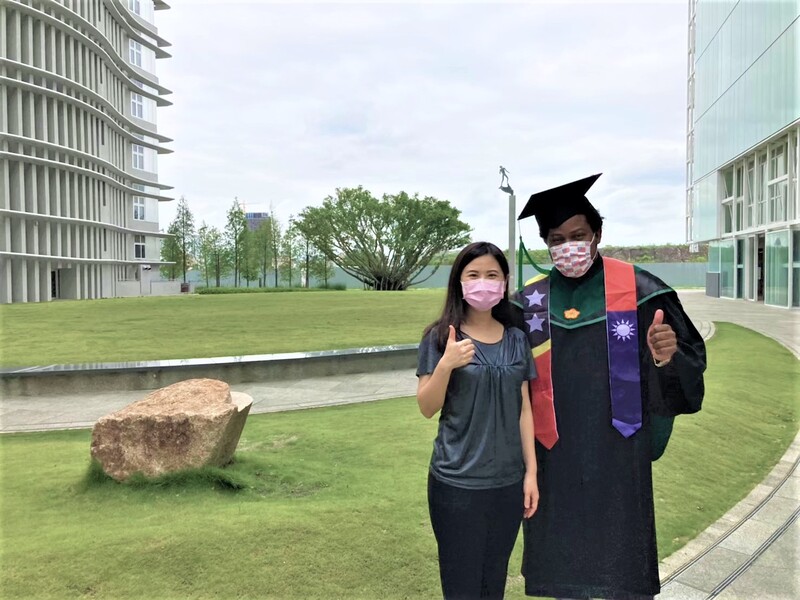
林若婷副教授與指導的聖克里斯多福及尼維斯環境部的官員Denrick Jeffers
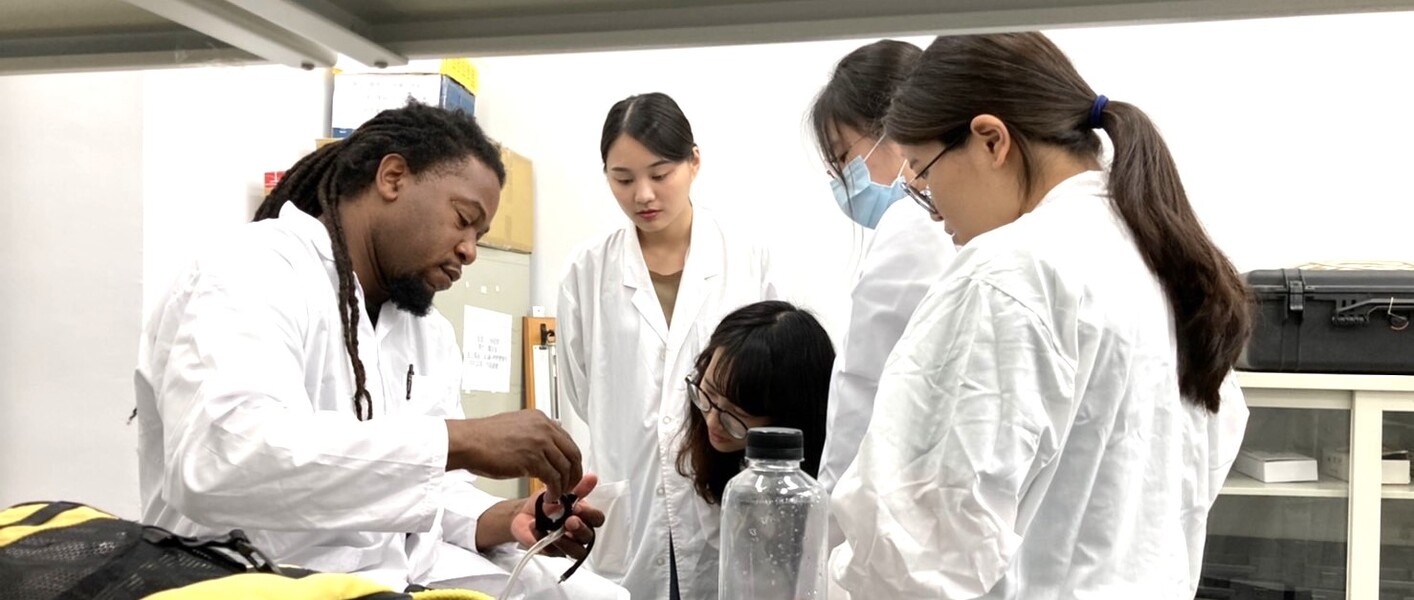
研究團隊進行實驗
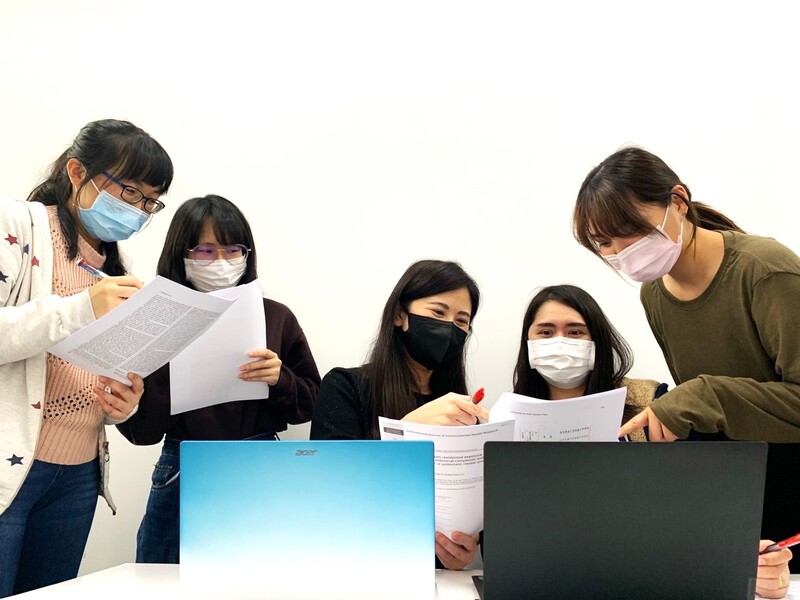
林若婷副教授團隊討論研究
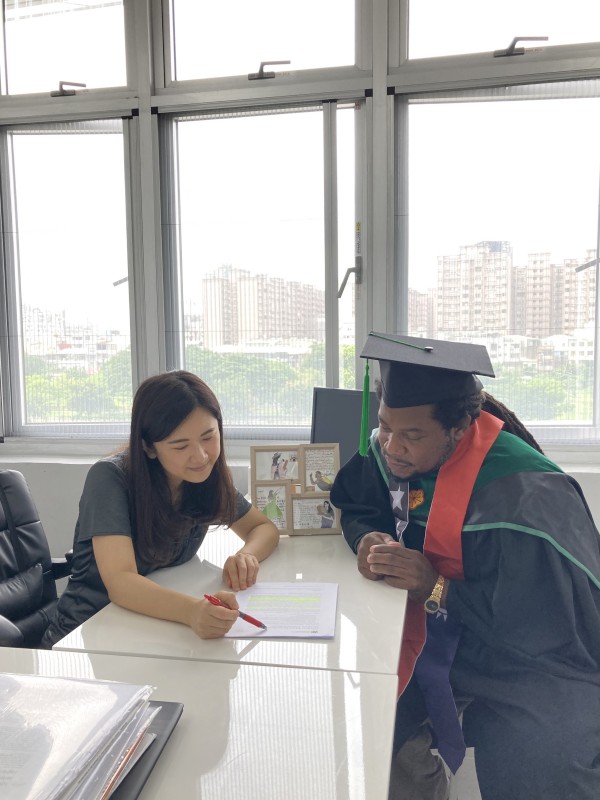
林若婷副教授論文指導
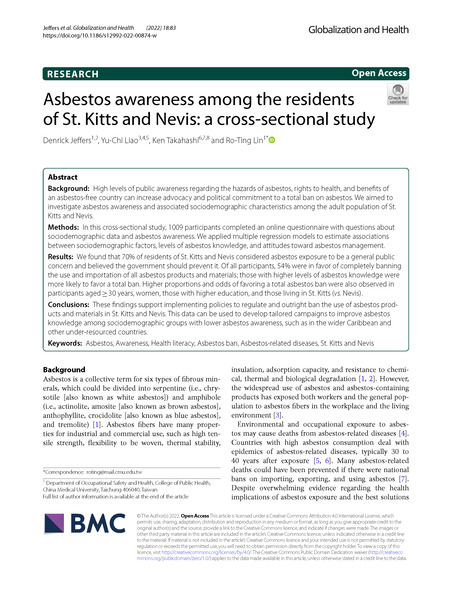
國際期刊《全球化與健康》論文

民時新聞報
回前頁






